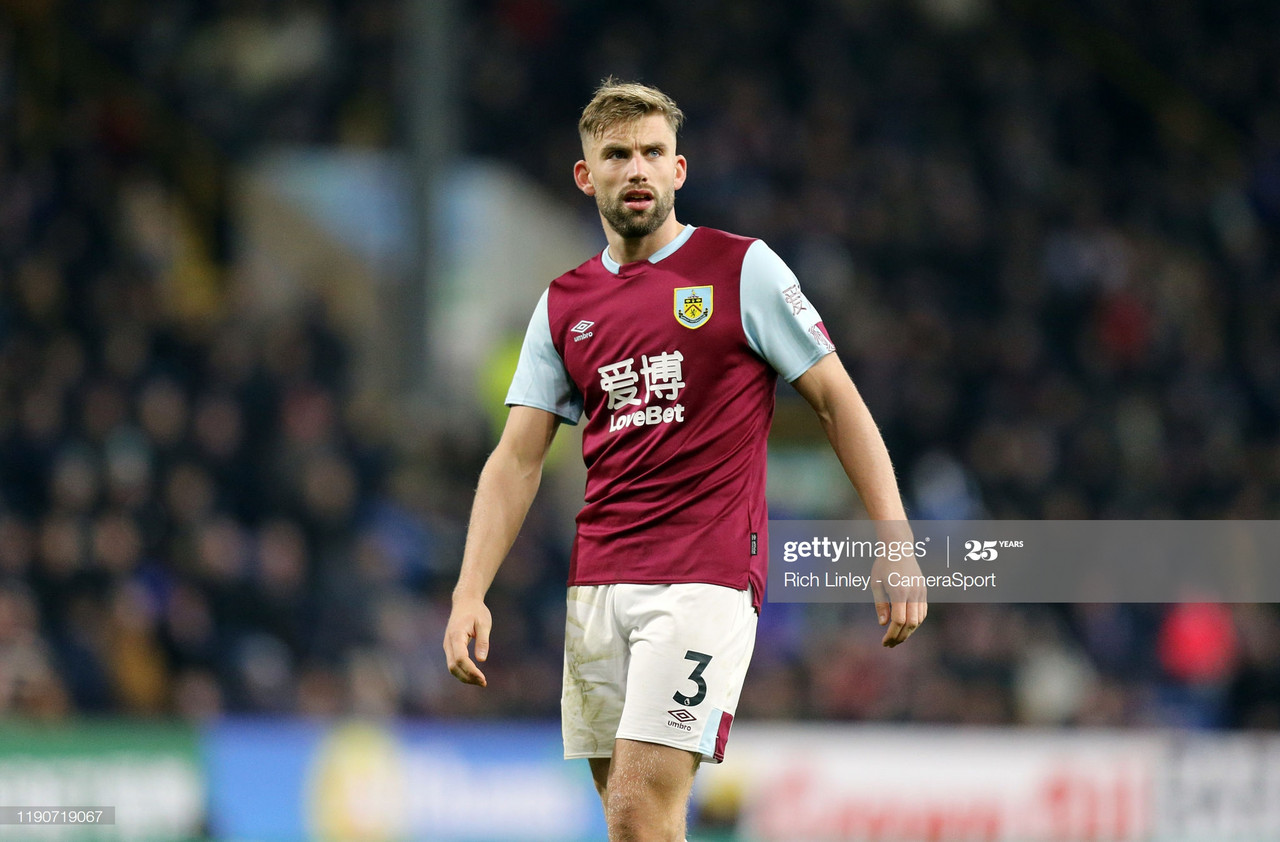If you were to ask a Premier League supporter (who isn’t a Burnley fan) who they think the top three English left-backs are, you will most likely get three names: Ben Chilwell, Danny Rose, and Luke Shaw. Whilst these players are very good on their day, there is one player who has risen to the top of the English game under the radar. His name is Charlie James Taylor.
Leeds United
Born in York on the 18th September 1993, Taylor was snapped up by Leeds United whilst he was still at school, playing in the junior teams from the age of 10. Upon leaving school, Taylor signed as a scholar at Leeds, where it would only be a year before he signed a professional contract with the club he had grown up at, but even the length of his contract was a sign of the ability that the Yorkshireman possessed as he was offered a three-year deal, as opposed to the one-year deals that were signed by fellow youngsters Nathan and Lewis Turner and Alex Cairns.
Taylor made his first senior appearance in a Leeds shirt against West Yorkshire rivals Bradford City in the League Cup at the age of 17, with his Championship debut coming a month later as he came into the starting line-up against Crystal Palace, assisting Ross McCormack’s opening goal in the same game. His performances for Leeds so far that season led to him being named in the England Under 19 squad for their Limoges Tournament campaign.
Loan moves to Bradford City, York City, Inverness Caledonian Thistle and Fleetwood Town in the following years would allow Taylor to hone his skills before making a return to Elland Road. His first game back since returning from his final loan spell came on the League Cup against Accrington Stanley, with his second appearance of the season coming off the bench in Leeds’ Championship game against Bolton on the 30th August, replacing the injured Stephen Warnock.
Taylor would not get another chance to shine until Warnock was injured again on the 30th of December 2014. The injury to Warnock allowed Taylor to come into the starting line-up for the FA Cup fixture against Sunderland on the 4th December. It was this period that allowed the young left-back to establish himself in the Leeds team, with form even leading to him being played on the left-wing in Neil Redfearn’s 4-2-3-1 formation, and even resulting in Stephen Warnock being sold to Derby at the end of the season.
Kicking up a fuss
As the seasons progressed, Taylor went from strength to strength at Elland Road, becoming one of the Whites’ star players, providing key assists from the left-back position, especially for Chris Wood (who would also later sign for Burnley). This star factor left Taylor with a number of Premier League suitors, but Leeds were still keen to extend his deal, however, Taylor was not as keen to stay in Yorkshire as the club would have liked. The club confirmed that he had declined to sign a contract extension (later revealed to be a three-year deal), with the club’s controversial owner at the time, Massimo Cellino, saying:
“Charlie is going to be a problem. I think his agent is the same as Sam Byram… Taylor doesn’t return the call.”
The summer passed without Taylor leaving Leeds, with the club even announcing in August 2016 that they had rejected a transfer request from the player so it seemed destined that he would see out the remaining year of his contract.
A good start to the season saw Leeds in 5th place in the Championship by Christmas 2016, with Taylor playing a starring role at left-back, but injury over the Christmas period meant that he lost his place in the starting line-up to Gaetano Berardi who would hold the position until the end of the season. It was at this point that things started to go downhill once again for Taylor and Leeds. Leeds would have needed a simply miraculous goal swing in order to finish the season in the play-offs but if anybody could have helped them get there, it was their mercurial young left-back, however, Taylor refused to play.
As punishment, he was fined two weeks wages but the retaliation from Leeds fans was even worse as they labelled him a “snake” and a “traitor” to the club that he played for since he was a child and when he signed for Burnley when the transfer window opened, they assumed that he would be a simple bench warmer, as Burnley went on to fight to stay in the Premier League.
How wrong they would turn out to be.
From West Yorkshire to the Mediterranean
Taylor made the move across the Pennines to Turf Moor on the 6th of July 2017 and it was clear to many Burnley fans that he wasn’t going to play a huge role straight away. Republic of Ireland international Stephen Ward was in good form in the left-back position, but he was coming towards the end of his Burnley career. He would, as many Burnley fans know, have a wonderful start to the season, scoring the second goal in Burnley’s 3-2 opening day victory over Chelsea at Stamford Bridge, but an injury in the December of that same season would signal the beginning of the end for Ward.
The injury to Stephen Ward came in the first half of Burnley’s home game against relegation strugglers Stoke City, which left the door open for Taylor to make his Premier League debut for the Clarets. A solid performance that showed Taylor’s potential followed, however, it was also this victory that saw Burnley climb up to fourth in the Premier League table. Taylor would make another ten appearances in a season that ended with Burnley secure in seventh place, allowing them to take part in Europa League qualification. European football was going back to Turf Moor for the first time in over 50 years, and Taylor would play his part.
The first qualification round saw Burnley travel to Pittodrie to face Aberdeen and the game ended in a tetchy 1-1 draw as a long term injury to Nick Pope in the first half was followed by a controversial penalty which was dispatched by Aberdeen’s Gary Mackay-Steven and then a late equaliser for the Clarets, scored by striker Sam Vokes. This draw meant that Burnley would go into the second leg needing only a goalless draw to go through to the next round.
Taylor once again found himself on the bench at the start of the game as the ever-consistent Sean Dyche felt it unnecessary to bring him in for the dependable Stephen Ward, but Taylor would play his part. Burnley scored early on through Chris Wood, to put them 2-1 up on aggregate but it wasn’t long until the Scottish side hit back. A wonderful overhead kick from Lewis Ferguson meant the score was a draw all round, and Burnley had lost their away goal advantage. The tie was to go to extra-time.
It was in the 90th minute when Dyche saw fit to bring the more attack-minded Taylor into the fray, and it was 11 minutes before he made his impact. As Burnley searched for the goal that could potentially win the tie, the ball was spread out onto the left-wing, and Taylor whipped a wonderful cross right onto the head of Jack Cork who found the net with ease.
As Burnley went on to win the game 3-1 thanks to a late penalty from Ashley Barnes, it was clear that the left-back role was in good hands. Nothing could back this up more than when the season finally came, Taylor played every single Burnley game following his appearance against Aberdeen, meaning that the only other competitive game that Taylor missed was the Carabao Cup defeat to Burton Albion.
One of the first names on the team sheet?
The 2018/19 season was something of an emergence for Taylor. Burnley fans knew from what they had seen the previous season and in the pre-season Europa League qualifiers that Taylor had the potential to be a brilliant player for the club, even better than Stephen Ward had been in previous years but one thing had worried them and that was his fitness. Taylor had arrived at Burnley and had to get used to Dyche’s way of playing and the lack of rotation means that the players have to be incredibly fit and have to be able to recover whenever possible. One thing that stood out as an issue for many Burnley fans was that by the time the game got to the later stages, Taylor often looked tired and this left the winger needing to play deeper in order to stop the defence being overrun. Taylor’s peak in form also arrived at the same time as an increase in fitness, allowing Burnley to be not only more effective on the attack at the end of a game, but also allowed Taylor to continue being as solid at the back as he is at the beginning of a game.
Another discovery that was made towards the end of the 2018/19 season was Taylor’s partnership with Burnley’s mercurial young left-winger, Dwight McNeil. McNeil came back into the Burnley first team after a couple of appearances at the start of the season when they played West Ham United at Turf Moor on the 30th December 2018 and it wasn’t long before the young player’s talent was discovered. The end to the 2018/19 season saw Taylor and McNeil’s relationship become paramount to Burnley’s eventual safety in the Premier League after a rocky first half of the season and that relationship has only become stronger in the current 2019/20 season. McNeil has been touted as one of England’s best young talents, but Charlie Taylor has been important to the winger being able to play with the freedom that he gets.
Taylor is naturally a more attacking full-back than his current replacement, Erik Pieters, and this allows him to get much higher up the pitch. Considering Burnley focus a lot of their play on getting crosses into the box, it only makes sense that they want to have both wide players on each side free to get a top-quality ball into the box, ready for one of the strikers to get on the end of it, but this is where McNeil adds another dimension to Burnley’s attack.
Anyone who watches Burnley week in week out will see a fearsome attacking channel down the left-and-side. This is especially true towards the end of the game when the opposition are stretched (an example being the end of the Bournemouth game at Turf Moor in February), McNeil is given licence to attack on either side of the pitch, as long as he does his defensive duties. Having Jeff Hendrick or Johann Berg Gudmundsson on the right as McNeil also attacks down the right or the centre of the pitch gives Burnley a more direct counter-attack and allows McNeil to shoot on his favoured left foot, but this leaves a lack of width on the left.
Taylor’s ability to get forward and backward quickly, both with and without the ball, alleviates any pressure and gives the team the option of passing it the left-wing where Taylor is able to either take the ball to the by-line and win an important corner or swing an early cross into the box. This is one of the reasons why Charlie Taylor is more than just a typical full-back and is definitely one of the reasons why he is one of the most underrated yet important players in the Burnley squad. Taylor allows McNeil to have the freedom that he has and whilst Erik Pieters does not exactly stifle the winger's play, he doesn’t help as much as Taylor does.
There is also the fact that many teams will spend a lot of time identifying McNeil as the threat of the team so they will often put two markers on him, this gives Taylor more space to work on the ball himself, something which he is more than capable of doing.
Next stop: England?
The England full-back positions are one of the most competitive places on the team, even though a lot of people focus on the centre-backs and the midfield, England are awash with very solid options. Ben Chilwell is currently Gareth Southgate’s first choice, but could there be a shout for Charlie Taylor to at least make the squad?
Danny Rose and Luke Shaw are currently Taylor’s closest competition other than Chilwell, and Taylor is ahead on the stats in many ways. When it comes to interceptions, clean sheets, tackles won, minutes played, and starts this season in the Premier League, Taylor is better than Shaw, and Rose and Rose also loses out on goals conceded.
Surely, with Taylor constantly developing in a good Burnley defence and alongside Dwight McNeil (who also could be on the edge of a senior call-up), it won’t be long before Taylor gets some form of recognition for the part he plays at Burnley, and it could come through the form of a senior England call-up.










































